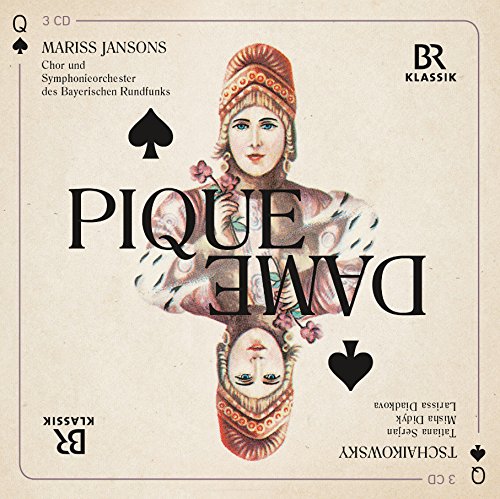TCHAIKOVSKY The Queen of Spades
View record and artist detailsRecord and Artist Details
Composer or Director: Pyotr Ilyich Tchaikovsky
Genre:
Opera
Label: BR Klassik
Magazine Review Date: AW2015
Media Format: CD or Download
Media Runtime: 168
Mastering:
DDD
Catalogue Number: 900129

Tracks:
| Composition | Artist Credit |
|---|---|
| (The) Queen of Spades, 'Pique Dame' |
Pyotr Ilyich Tchaikovsky, Composer
Alexei Markov, Prince Yeletsky, Baritone Alexey Shishlyaev , Count Tomsky, Baritone Chor des Bayerischen Rundfunks Chor des Bayerischen Rundfunks Kinderchor der Bayerischen Staatsoper Larissa Diadkova, Countess, Mezzo soprano Mariss Jansons, Conductor Misha Didyk, Hermann, Tenor Oksana Volkova, Polina, Mezzo soprano Pyotr Ilyich Tchaikovsky, Composer Tatiana Serjan, Lisa, Soprano |
Author:
While Eugene Onegin is Tchaikovsky’s most popular opera, there’s a fair argument that The Queen of Spades is his best. A gripping drama, it requires performances where you believe in Herman’s psychological descent as the desire to learn the secret of the three cards from the old Countess consumes everything, including his love for Lisa.
The opera has been lucky on disc, dominated in recent decades by recordings from Valery Gergiev and Seiji Ozawa, both from the early 1990s. They are joined by this resplendent account from Mariss Jansons and the Bavarian Radio Symphony Orchestra, recorded in concert. Jansons has a fine pedigree in Tchaikovsky (his cycle of the symphonies for Chandos still holds strong) and he paces the opera unerringly well, building tension superbly. His Bavarians respond with atmospheric playing, burnished strings and dark woodwind coloration to the fore.
Alexandra Maria Dielitz’s excellent booklet essay explains how the Mariinsky director tried to persuade Tchaikovsky to set Pushkin’s story as an opera, ‘a Russian Carmen’. Parallels are drawn in deciphering fate from cards, but Tchaikovsky also channels Bizet in his children’s mock-soldier chorus. The Bavarian State Opera children’s choir offer characterful singing, if not as earthily Russian as Gergiev’s urchins. Jansons keeps the Mozartian pastiche light and fleet-footed, and even employs a fortepiano for Lisa and Polina’s duet to give a period feel.
Tatiana Serjan is a vibrant, fearless Lisa, as one might expect from a soprano who tackles the roles of Abigaille and Lady Macbeth. Hers is a voice with plenty of ‘blade’ when required, yet she can shade it beautifully. Her aria by the River Neva, as she awaits her final confrontation with Herman, is heartfelt. I prefer her to Mirella Freni, past her best when recording the role for Ozawa, while she matches Maria Guleghina (Gergiev) for drama. Misha Didyk, a less than convincing Manrico at La Monnaie (Bel Air, 2/15), surprises with his baritonal depths here as Herman, as well as a ringing top. There’s vivid characterisation too, thrilling in his encounters with Serjan’s Lisa, without the occasional spills of Vladimir Atlantov (Ozawa) or Gegam Grigorian (Gergiev).
Larissa Diadkova’s Countess happily relies more on secure vocal technique than scary histrionics and Oksana Volkova is a rich-voiced Polina. When it comes to the baritones, Jansons can’t quite compete with Ozawa. Alexey Markov is less refulgent of tone than Dmitri Hvorostovsky but sings a noble account of ‘Ya vas lyublyu’. Similarly, Alexey Shishlyaev lacks Sergei Leiferkus’s sardonic bite as Tomsky, but his narration of the legend of the three cards is effective, despite his upper notes being pushed.
With an excellent recording – despite applause and some stage noise – this is a highly recommendable version of Tchaikovsky’s opera which pulls the listener into the drama.
Discover the world's largest classical music catalogue with Presto Music.

Gramophone Digital Club
- Digital Edition
- Digital Archive
- Reviews Database
- Full website access
From £8.75 / month
Subscribe
Gramophone Full Club
- Print Edition
- Digital Edition
- Digital Archive
- Reviews Database
- Full website access
From £11.00 / month
Subscribe
If you are a library, university or other organisation that would be interested in an institutional subscription to Gramophone please click here for further information.




